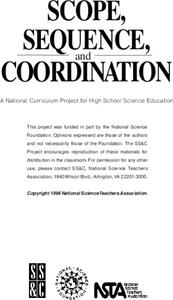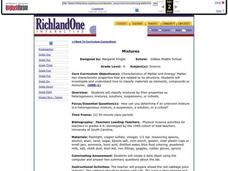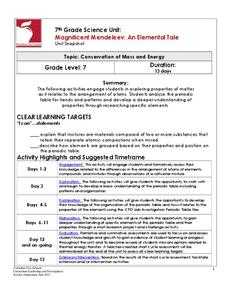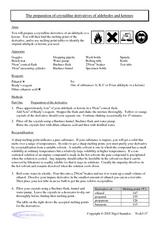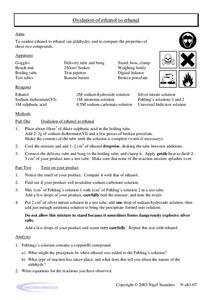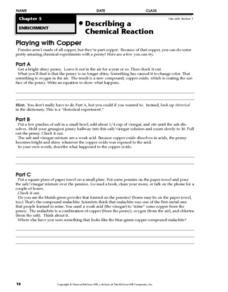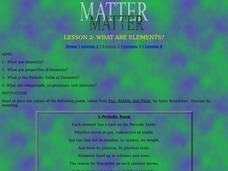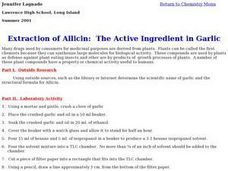Curated OER
Matter and Energy
Does the change in energy of matter lead to a change in mass? Upcoming chemists compare the mass of equal-volume, but different-temperature liquids and materials both before and after a chemical reaction has occurred. In another...
Curated OER
Classification of Matter
This is a great instructional activity with an infographic to assist your high schoolers in categorizing matter into mixtures and non-mixtures. Information is given about the metric system of measurement. Your young students match 13...
Curated OER
Mixtures
Sixth graders experiment with mixtures. For this chemistry lesson, 6th graders determine which mixtures are considered heterogeneous, a suspension, a solution or a colloid. Students create a data sheet of what they discover.
Science 4 Inquiry
All the Small Things
Scholars use sorting cards to try to define a pure substance versus a mixture. Risk becomes reward as they observe the differences and create a flowchart sorting matter into mixtures and pure substances (elements and compounds).
Curated OER
Programming the "Rinse Robot"
Experienced chemistry technicians use then layer chromatography to discover how much of a free compound is left after each rinse cycle. Where this could obviously be used as a practice with chromatography technique, it can also be used...
Curated OER
Polymers Lab: Bouncy Ball and Slime
Eighth graders investigate chemical reactions to produce polymers. In this polymers lesson plan, 8th graders experiment with sodium silicate and ethyl alcohol to make a polymer. They also experiment with borax and glue to make a polymer....
Curated OER
Density Studies of the Earth
Density comes to life as investigators place soda cans into containers of various liquids to find if they sink or float. They layer different density liquids, compare densities of different gases, and more. A total of six different...
Columbus City Schools
Magnificent Mendeleev: An Elemental Tale
Discover how the periodic table tells the story of its elements. Learners begin by studying the makeup of several mixtures. Their analysis leads to a discussion of elements and the periodic table. As they dig deeper, they understand the...
Curated OER
The Effects of Temperature on Chemical Mixtures
Students explore chemical cahnges and the effect of temperature on chemical mixturees, They make observations of the behavior and appearance of certain chemical mixtures and reactions.
Curated OER
Lab: Percent of Composition of KClO3
Students find the percent of oxygen in potassium chlorate. In this percent composition lesson plan, students heat a solution of potassium chlorate using a catalyst, manganese dioxide, to decompose the potassium chlorate and release...
Curated OER
Up and Atom
"Up and Atom" is a mini-unit introducing middle-schoolers to the wonders of elements. Participants draw atom models, examine the periodic table, compare samples of metals to nonmetals, identify unknown elements, and more! The beginning...
Curated OER
Preparation of Crystalline Derivatives of Aldehydes and Ketones
Chemistry explorers prepare a crystalline derivative and find its melting point. Once they discover the melting point, they are able to identify whether or not the substance is pure, and whether it is an aldehyde or ketone. This is an...
LABScI
Freezing Point Depression: Why Don’t Oceans Freeze?
Can you go ice fishing in the ocean? Learners examine the freezing point of different saltwater solutions. Each solution has a different concentration of salt. By comparing the freezing points graphically, they make conclusions about...
Massachusetts Institute of Technology
Lego Atoms and Molecules: Chemical Reactions
Show young chemists what a chemical reaction looks like with two parts of a hands-on experiment. First, learners conduct a wet lab where they observe the reactants (baking soda and calcium chloride, with phenolsulfonphthalein) before,...
Chymist
Esters: An Introduction to Organic Chemistry Reactions
Scratch and sniff an introduction to organic chemical reactions. A creative lesson has individuals study the esters commonly used in scratch-and-sniff stickers and advertisements. Following the lab procedure, scholars create the organic...
Curated OER
Science
Students read labels of candy bars. In this ingredients lesson, students examine a variety of candy bar labels to determine the contents. Students research to find additional information on each candy bar, then write an opinion article...
Curated OER
Oxidation of Ethanol to Ethanal
Here is a laboratory exercise where chemistry masters carry out an oxidation reaction to change ethanol into ethanal. They compare the original alcohol to the resulting aldehyde by forming a precipitate. Definitely aimed at learners...
Curated OER
Describing a Chemical Reaction: Playing with Copper
Three experiments involving pennies help young chemists see the chemical reactions between copper and other elements. The first experiment is rhetorical (it prompts students to leave a bright penny out for a year) but the second two...
Curated OER
Mummy Dearest
Students assess what environmental conditions best contribute to preservation and mummification by participating in a multi-day 'apple mummification' lab.
Curated OER
Water Resource Engineering
Learners examine solubility and the significance of water. In this aqueous solution instructional activity students complete a lab activity on soil profiles.
Curated OER
What Are Elements?
Students investigate elements by by defining scientific terms. In this Periodic Table of Elements instructional activity, students utilize a glass of water, and powdered fruit drink to perform a lab activity demonstrating properties of...
Sunlight Cal-Tech
Chromatography of Plant Pigments
Through a hands-on activity, an acetone-spinach solution is pre-made and learners use this solution to separate the pigments found in spinach using chromatography. The comprehensive resource includes an analysis and conclusion questions.
Curated OER
How To Culture Bacteria in the Laboratory
Students participate in an experiment in which they culture bacteria in a lab setting. They record their observations and analyze the data. They answer comprehension questions to end the lesson plan.
Curated OER
Extraction of Allicin: The Active Ingredient in Garlic
Learners conduct research to determine the structural formula for Allicin, a component of garlic. They participate in a lab to extract Allicin from garlic and complete a set of questions about their work.


